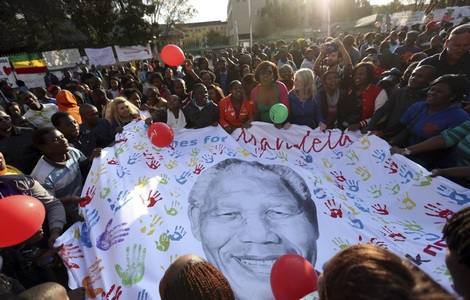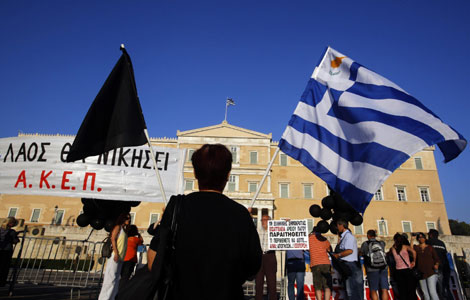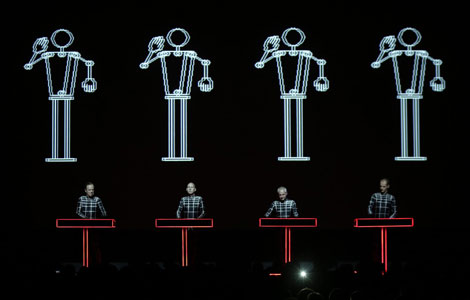

![Head of the ROK's working-level delegation Suh Ho (right) shakes hands with his DPRK counterpart Park Chol-su upon Park's arrival at the Kaesong Industrial District Management Committee in Kaesong July 10, 2013.The two sides began working-level talks on Wednesday to discuss the normalisation of operations at the jointly run industrial park, including the resumption of facilities inspections, according to local media.[Photo/Agencies] ROK, DPRK end morning session amid differences](../../images/attachement/jpg/site1/20130710/eca86bd9e2fb13474b2301.jpg) |
|
Head of the ROK's working-level delegation Suh Ho (right) shakes hands with his DPRK counterpart Park Chol-su upon Park's arrival at the Kaesong Industrial District Management Committee in Kaesong July 10, 2013.The two sides began working-level talks on Wednesday to discuss the normalisation of operations at the jointly run industrial park, including the resumption of facilities inspections, according to local media.[Photo/Agencies] |
SEOUL - The Republic of Korea(ROK) and the Democratic People's Republic of Korea (DPRK) ended the morning plenary session of the follow-up working-level talks after confirming their different views over the "productive" normalization of the joint industrial park in the DPRK's border town of Kaesong, local broadcaster YTN reported Wednesday.
Three-member delegations from each side closed their plenary session at 11 am local time, just 25 minutes after starting the talks. The dialogue was originally scheduled for 10:00 am, but it was delayed due to some technical glitches of communication lines.
During the 25-minute session, representatives from both sides outlined their views over how to normalize, in a productive way, the joint industrial zone, which has been suspended for more than three months.
"It would be a first step for trust that the South and the North (DPRK) reach an agreement, and then abide by the agreement. For such cooperation, let's exchange opinions for productive normalization of the Kaesong industrial complex," Suh Ho, Seoul's top delegate and director-general of the Unification Ministry's inter-Korean district support directorate, said in his introductory remarks.
In response, Park Chol-su, Pyongyang's top negotiator and vice director of the General Bureau of the Central Special Zone Development Guidance, said "It is heavily raining. I'm deeply worried about facilities and materials of companies (with factories at the complex)."
ROK has said that the DPRK should clarify its position on the damages done to ROK firms caused by its unilateral shutdown of the complex, urging the DPRK to provide a clear assurance to prevent recurrence of such a scenario.
Seoul demanded that the industrial zone comply with international norms. ROK President Park Geun-hye on Monday stressed the importance of Kaesong industrial park " conforming to common sense and international standards."
In contrast, Pyongyang has reportedly favored the reopening of the joint industrial park without any preconditions.
Suh, Seoul's top delegate, told reporters before heading to the dialogue venue that "it would be a first step for the productive normalization of the Kaesong industrial complex to reach an agreement complying with common sense and international norms based on our government's trust-building process on the Korean Peninsula."
He said that the Seoul delegation "will do its best to channel small trust between the South and the North (to be built at the talks) to a greater cooperation."
The follow-up talks came three days after both sides agreed in principle to normalize operation of the joint industrial park at Kaesong, just north of the heavily armed border.
The DPRK also allowed ROK businessmen to visit Kaesong Wednesday to bring back finished products and materials out of the complex and maintain facilities vulnerable to the humidity during the rainy season.
Three ROK delegates along with 20 other officials crossed the military demarcation line (MDL) at around 8:30 am before heading to the dialogue venue at Kaesong, according to the ministry.
Under the Sunday agreement, 59 managers from 59 ROK companies crossed the MDL at around 9:00 am to visit the factory park for maintenance work. Other company managers planned to cross the border in the next day to check their facilities.
The industrial zone, where 123 ROK companies run factories, was suspended in April 9 when Pyongyang banned around 53,000 of its workers from reporting to work amid high tension on the Korean Peninsula. Seoul also withdrew its personnel after the DPRK rejected talks.







